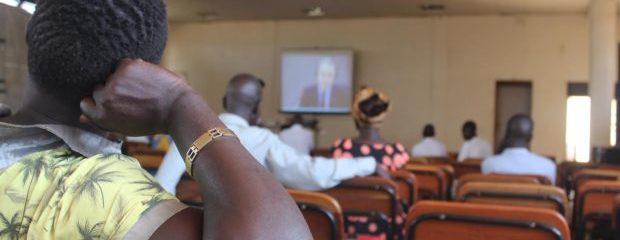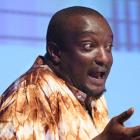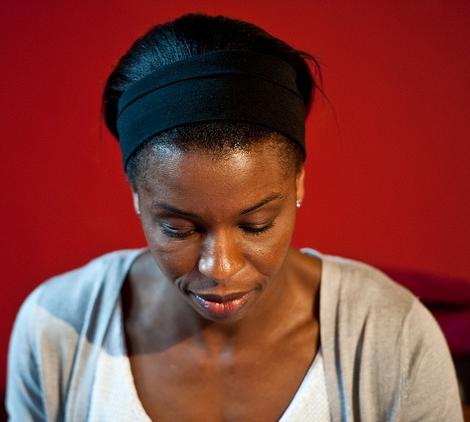Who cares about the ICC’s trial of LRA fighter Dominic Ongwen?

Thousands were killed and hundreds of thousands displaced in the conflict with the Lord’s Resistance Army. So why aren’t more Ugandans following the first public trial on the matter?

Watching proceedings in Gulu. Credit: Oryem Nyeko.
Given that it is the first public trial for crimes committed in the two-decade war between the Lord’s Resistance Army (LRA) and Ugandan army, the case against Dominic Ongwen at the International Criminal Court (ICC) should, theoretically, be at the forefront of most Ugandans’ minds.
But what should be an opportunity for a national conversation on justice and accountability appears to be limited to a select group of people. Even in much of the north, the region from which thousands of people were killed and hundreds of thousands displaced in the conflict, few Ugandans seem to be following proceedings.
[“You belong to Joseph Kony”: How Dominic Ongwen and others became child soldiers]
This is partly because of the practical realities of holding the trial thousands of miles away in The Hague rather than in Uganda. But it is also a result of the well-intended, but flawed, approach to outreach by the ICC.
“Affected communities”
The ICC’s outreach strategy for this case has been clear: to engage with the communities tied to the case as much as possible. Accordingly, screenings of the proceedings have been held in the four locations in northern Uganda that Ongwen is alleged to have led attacks as a senior LRA commander in 2004: Pajule; Odek; Lukodi, in the Acholi region; and Abok, where most identify as Langi.
The focus on these four areas is deliberate. These are the communities that would appear to have the most vested interests in the case, being home to the victims of the mass murders, abductions and looting for which Ongwen is accused of being responsible.
Additionally, because of the possibility of compensation for victims at the conclusion of the trial, the court has worked extra hard in these areas to calm expectations about the ICC’s reparations programme.
However, Ongwen and the LRA’s infamy are not limited to attacks on four camps in 2004. Nor were victims of the violence exclusive to the Acholi speaking regions of Uganda. It therefore comes as a surprise that the ICC’s focus has been largely limited to these places, and that it has seemingly been geared to accommodate only Acholi speakers; Acholi is the sole Ugandan language into which the official live streams of the proceedings are being translated.
Should an outreach strategy only focus on the “affected communities”, especially where the scope and impact of the alleged crimes are far more wide reaching than those geographical areas?
If the interests of the communities are to be a deciding factor at least, then the answer is no. In research with these groups in 2015, we found that many people were concerned with the “othering” that comes with being labelled a victim community in a case such as this. This is particularly true where reparations – something the bulk of victims of both state-led and LRA atrocities have not received – are a distinct possibility for that population.
People in Lukodi, for example, were eager to emphasise the need for dialogue with Ongwen’s own community to facilitate a level of understanding. This would, in their view, negate the status that comes with being an “affected community”.
Another notable aspect of the ICC’s approach in northern Uganda is its use of local NGOs as conduits to the communities it wants to reach. It is not unusual for the staff of local NGOs to facilitate ICC-funded events and act as a friendly face for the court. Partnership is, of course, an important part of civil society work and a useful tool that the court can use to gain the trust and familiarity of people in the area.
But the result here is that – unlike in Kenya where civil society was noted for its vibrant role in the investigation and prosecution of perpetrators of the 2007-08 election violence – northern Uganda’s civil society suffers from having to balance providing critical input with effectively being an extension of the same court.
Legacy of the war
It should be noted that, previously, official screenings of the trial have also been held in the town of Gulu in the north and in Ongwen’s village of Coorom. The screenings in Gulu, however, proved to be a challenge given the very inconsistent internet and electricity. Understandably then, the ICC only held screenings here in the trial’s early stages, leaving those interested in following the rest of it to watch it online or simply not at all, since the hearings were not broadcast on radio or television.
It’s not surprising, therefore, that when speaking to boda boda riders – the local repositories of current affairs in Gulu – about what is happening with Ongwen at the ICC, many have more questions than answers.
It has been around a decade since the war ended and, since then, northern Uganda, once defined by conflict, has had its identity change. Even so, the legacy of the war remains a major part of the region and very few of its residents are young enough not to remember it or its impact.
It is of course possible that the Ongwen trial would never have been at the forefront of everyone’s minds, but its inaccessibility to most people, and the choices the court has made in reaching out to them, has certainly had a bearing on how relevant it is.
Oryem Nyeko works with the Justice and Reconciliation Project in Gulu, Uganda. He can be found at @oryembley.






